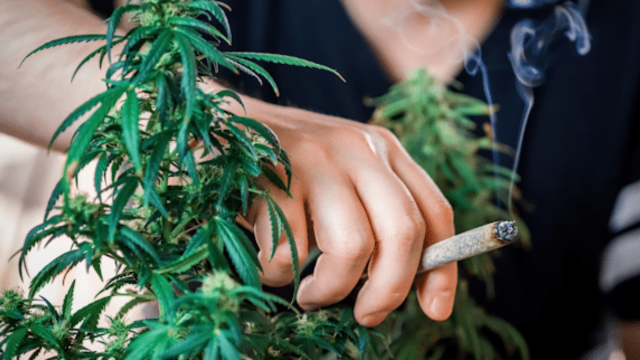Think about this: While you are driving along the warm coast of Miami with the windows down and the music playing loudly, you become aware of flashing lights in your rearview mirror. The police approaches your vehicle as you pull over, and you feel a little bit of dread as he approaches your vehicle. Following the verification of your license and registration, the conversation will go in a different direction. A question is posed by the officer: “Is that marijuana I smell?” Although you did have a partner who rode with you earlier, you have not been under the influence of any kind of substance. At this moment, you are experiencing feelings of anxiety. Does the police have the authority to search your vehicle simply because they detect the odor of marijuana?
As is the case with a great number of other legal matters, the answer in Florida is not a simple yes or no. The answer to this question is determined by a complex interaction between recent changes in marijuana legislation, the concept of probable cause, and the protection provided by the Fourth Amendment against arbitrary searches and seizures. The purpose of this essay is to answer the vital subject of whether or not law enforcement officers in Florida have the authority to search your vehicle just because they detect the odor of marijuana when they drive by.
There has been a shift in the legal landscape, as evidenced by the expansion of medical marijuana and hemp.
Similar to the majority of other states, Florida has made significant modifications to the legislation that govern marijuana. People who suffer from certain incapacitating ailments and who satisfy the standards were able to legally obtain marijuana for medical purposes in the state in the year 2016. The capacity of law enforcement to use the aroma of marijuana as a justification for conducting a search was made more difficult by the new terrain at hand. In the past, all forms of marijuana were prohibited, which made things somewhat easier for those who were in charge of providing law enforcement. The introduction of medical marijuana, on the other hand, brought about the dilemma of how authorities can differentiate between marijuana that is legal and marijuana that is illegal using marijuana.
The advent of hemp, a cannabis plant that contains just trace amounts of THC, the psychoactive component that is responsible for the “high” that is associated with marijuana, adds another layer of complication to the problem. As a result of the potential health benefits associated with hemp, products produced from hemp, such as CBD oil, have gained popularity. These products frequently have a scent that is comparable to that of marijuana.
The concept of probable cause and the Fourth Amendment to the Constitution
The Fourth Amendment to the Constitution of the United States allows for the protection of individuals from searches and seizures that are deemed to be unreasonable. This suggests that in order for law officials to examine your vehicle, they will likely require a warrant and a search warrant. Nevertheless, there are exceptions, and one of them is the concept of likely causality. It is possible for an officer to have probable cause when they have a reasonable belief that a crime is being committed or when they have proof that a crime is being committed. In the past, the courts in Florida have often determined that the mere presence of the aroma of marijuana is sufficient grounds for conducting a search of a vehicle.
To what extent does the smell of marijuana still provide sufficient grounds for conducting a search?
The legal position has become more difficult as a result of the legalization of using marijuana and hemp for medical purposes. Within the context of the case State v. Hurd, which was tried in the Second District Court of Appeals of Florida in 2021, this particular subject matter was discussed. It was acknowledged by the court that the legalization of hemp could result in complications, such as law enforcement officials mistaking the scent of hemp for that of marijuana. In spite of this, the court ultimately decided that the odor of marijuana that has been smoked might still be considered a reasonable grounds for a search.
The distinction between marijuana that had been burned and marijuana that had not been burned served as the foundation for the court’s reasoning. The court came to the conclusion that burnt marijuana was a more reliable indicator of recent drug use than unburnt marijuana, which may have been obtained from merchandise made from hemp. Uncertainty has been brought about as a consequence of this choice, on the other hand. What are the consequences that will occur if the authorities detect a scent of marijuana that has not been burned or if the aroma is not strong enough? This is sufficient for them to search the vehicle, right?
There are additional factors that influence search authorization in addition to the smell.
When deciding whether or not there is probable cause, law enforcement officers take into consideration a number of factors, one of which is the aroma of marijuana. Here are some more considerations that may influence the decision of a law enforcement officer to search your vehicle:
- If the officer sees drug paraphernalia, such as rolling papers or pipes, in plain sight, this increases their case for probable cause.
- Driver behavior: Erratic driving, anxiety, or bloodshot eyes might arouse suspicion and signal potential impairment.
- Passenger admissions: If a passenger admits to having marijuana, this could provide the officer a reason to search the vehicle.
Knowing Your Rights: What to Do During a Traffic Stop
If you are stopped by the police and the officer thinks you have been using marijuana, it is crucial to be kind and respectful. You have the right to stay quiet and to decline a search of your vehicle. Here are a few suggestions:
- Be respectful but assertive: If you do not want your vehicle to be searched, you might say, “I do not consent to a search of my vehicle.”
- Do not provide information unless asked: Unless it is absolutely necessary, do not acknowledge that you smoke marijuana or have it in the car.
- Be aware of when to ask for a lawyer: If you are uncertain about your rights or pushed in any way, kindly ask to talk with a lawyer before agreeing to anything.
Final Thoughts
The laws regarding marijuana searches in Florida are changing. Even though the smell of burnt marijuana can still be considered probable cause in some situations, the presence of medicinal marijuana and hemp products complicates matters. Keep in mind that the Fourth Amendment guarantees your right to privacy.
Can Florida Police Search Your Vehicle If They Smell Marijuana? Website


 by
by 




